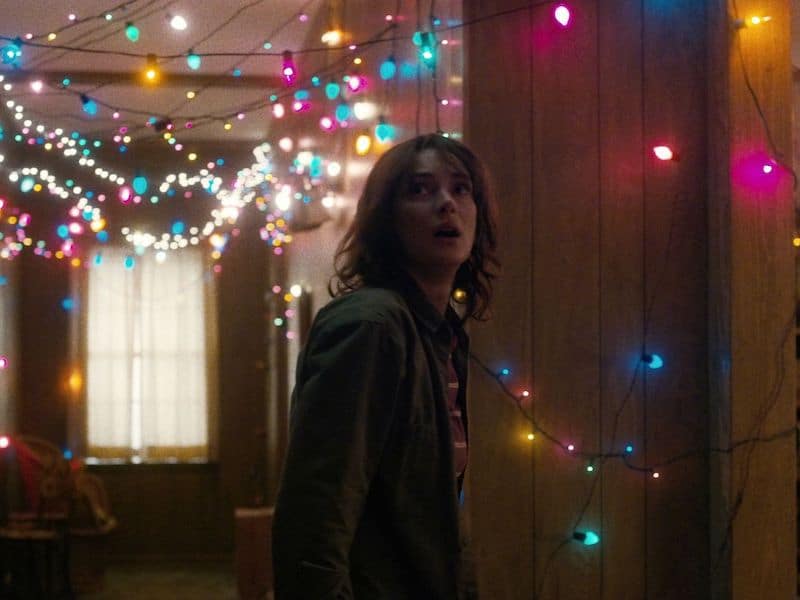
Stranger Things is a campfire story. It doesn’t take place at camp, but it traffics in the vocabulary of teenage ghost tales. Despite its heavy ’80s Spielberg and Stephen King references, the Netflix drama is never as bright or snide as either, though it too is a story of innocence and brutal fear. This time the lights are hesitant and flickering, not neon, and the high school bathes its resident stereotypes in a cool, complex glow. A synth score and era-appropriate soundtrack choices feel more like modern throwback horror (It Follows, You’re Next, The Guest) than pandering to a generation. There’s nostalgia here, but it’s endangered.
As the controlled childhood chaos of E.T. spirals into the wooded, slow-burn, quasi-mystical police work of True Detective, its characters grow closer and apart like the lung of an unseen beast. Normal nerdy boyhoods are broken and broken families cling to the scraps. One of the four central kids disappears one night, setting off a manhunt somewhere between The X-Files and Serial.
The mystery grows deeper as showrunner brothers Matt and Ross Duffer fill their Indiana town with lives that should feel cliché. Through spot-on casting, performance, and little writing quirks, their characters usually manage to overcome their unoriginality. The show loves its nerdy central boys and knows them well enough to have them bond over The Lord of the Rings and Dungeons and Dragons (including the best incorporation of the game this side of Community). Despite this, they still sometimes suffer from making screenwriter screw-ups, which are the terrible decisions we know people wouldn’t make, but they do in movies and TV shows because it just helps the story move. While they may be cute and talented, their early stupidity can be vexing for its transparency into the writing process, if nothing else.
Their older counterparts, connected via the main boy’s high school sister, are pimply, hormonal, and exerting maximum effort to hold up their teenage veneers of coolness. Natalia Dyer plays her role with a bookish, selfish innocence that just feels right. She’s even got a sleazy boyfriend that looks like teenage Jean-Ralphio mixed with Andrew Garfield. Stranger Things gives us groups at different stages of development as they deal with loss and lies, combining many nostalgic ideas into something new and effective. Brothers bond to overcome divorced parents, children bond to overcome their missing friend, adults bond over the loss of a child.
While the emotions and effects are completely engrossing, the real stand-outs of the four-out-of-eight first season episodes I watched for review are two key performances. Millie Brown plays a strange girl whose character details should be kept quiet as much as her performance should be shouted from every rooftop. She, an outsider to the kids she falls in with, is asked to be quizzical, bored, adorable, and scared out of her mind. Blank without blankness – something that could easily be grating to watch. Brown’s every moment rises to these tasks and more, making her presence an irreplaceable part of the drama.
The second performance is that of Winona Ryder, who plays the missing boy’s mother. Her genre and era notoriety may feel like stunt casting, but she very quickly silences any doubts with a Liam Neeson-caliber moment on a phone in the very first episode. Not only his her character high octane and meaty from the first moment, but her approach to horror/thriller acting is a much more personal and relatable than what we’re used to. Her character is written so well that her diplomatic love for her sons and her harried corduroy inform her loss. She’s loud, distressed, focused, and uncompromising rather than the quiet suffering or resolute toughness of typical final girls. We feel her every ache and when she’s faced with a few beautifully choreographed supernatural occurrences, her wild-eyed mix of hope and disbelieving fear sync in scenes that could otherwise flop in stories without this caliber lead. The pacing of her character tracks her emotional state so well that each time Ryder appears, we know exactly how we would feel in her place and she never falters.
She finds her doubtful foil in David Harbour’s broken police chief as they investigate the boy’s disappearance. The pseudo-innocuous prejudices of townspeople, whether kids, teens, or adults, are woven into the fabric of the supernatural thrills, creating a world not without its problems, but one that’s problems strengthen its mystery. The twists are exclamation-worthy, the loss is heavy, and the love is fragile. Completely bingeable and utterly spooky, Stranger Things will absorb you with more consistency than even Mulder and Scully could muster.
If this is going to make you binge, please let me know in the comments. I’d love to see how other people’s journeys/reactions go.
Related Topics: Netflix, Science Fiction, Stranger Things
